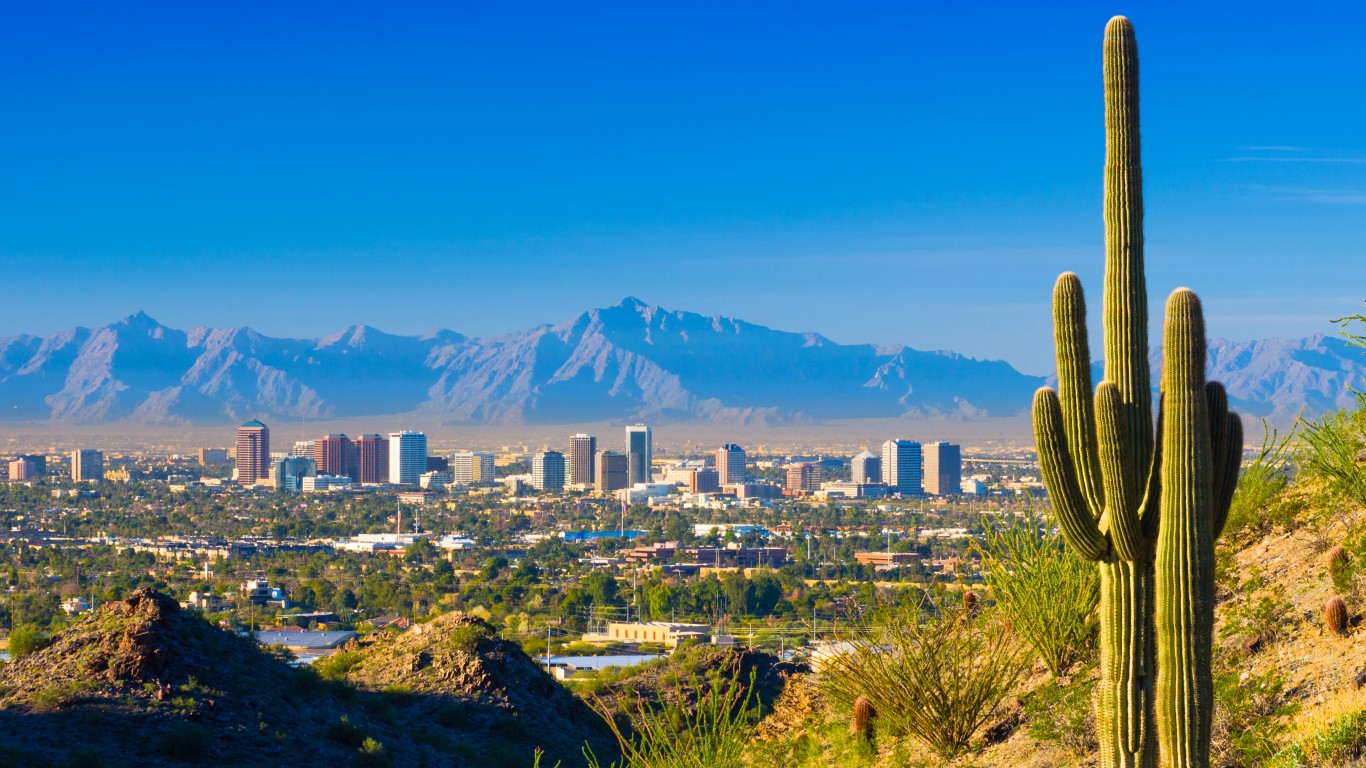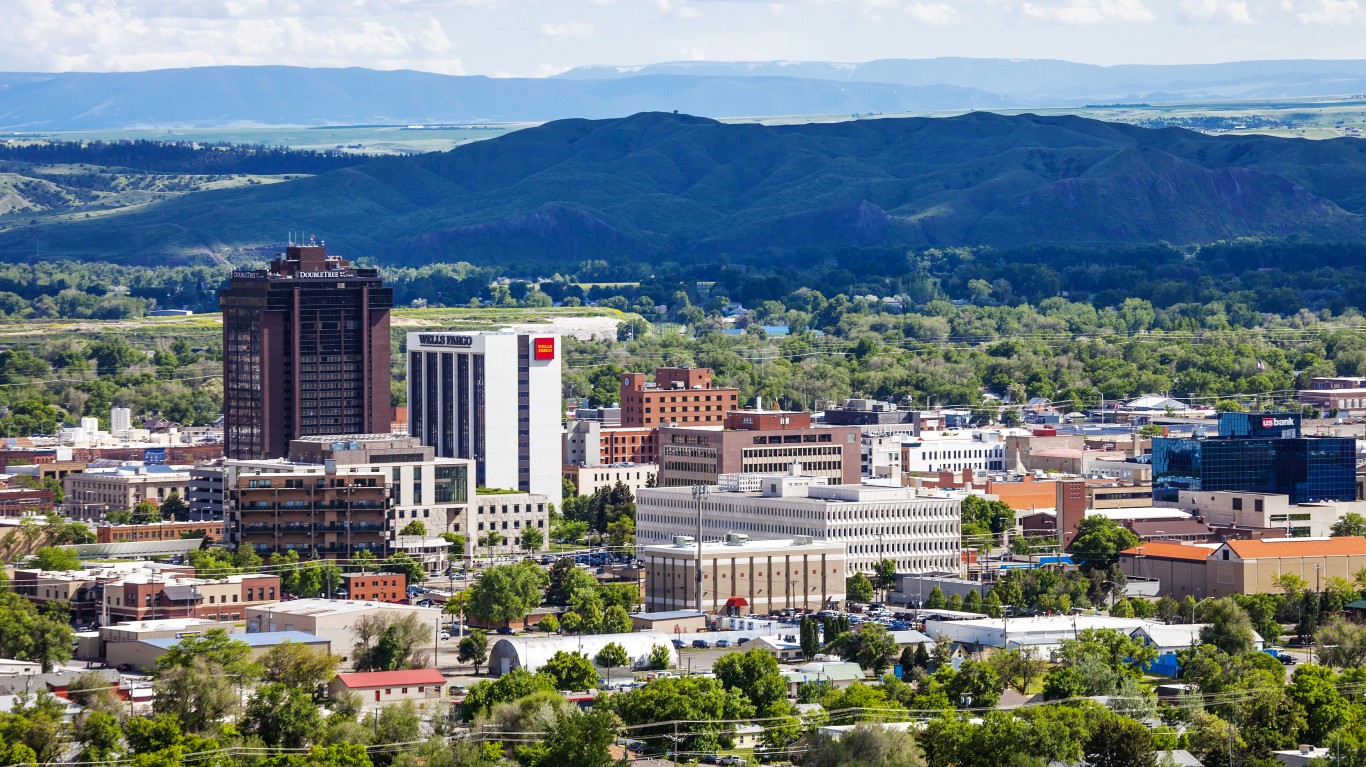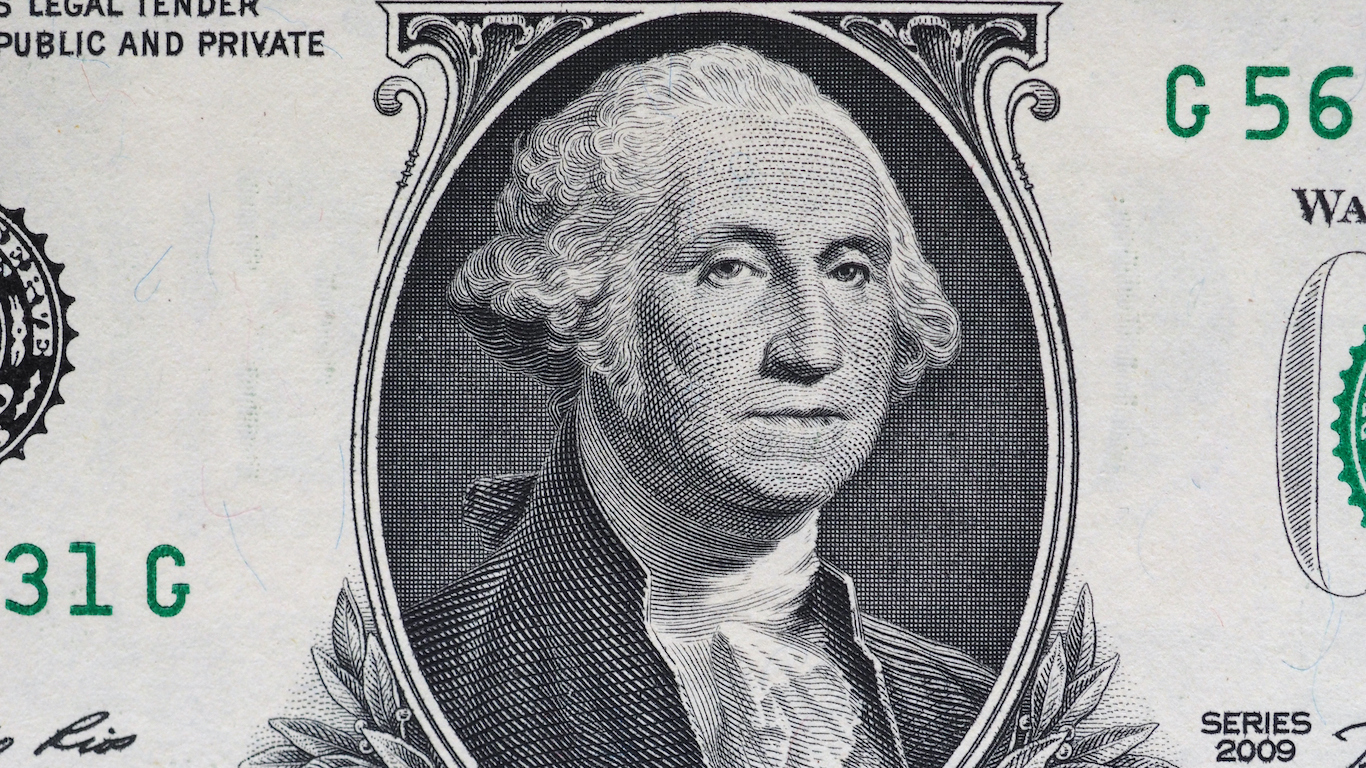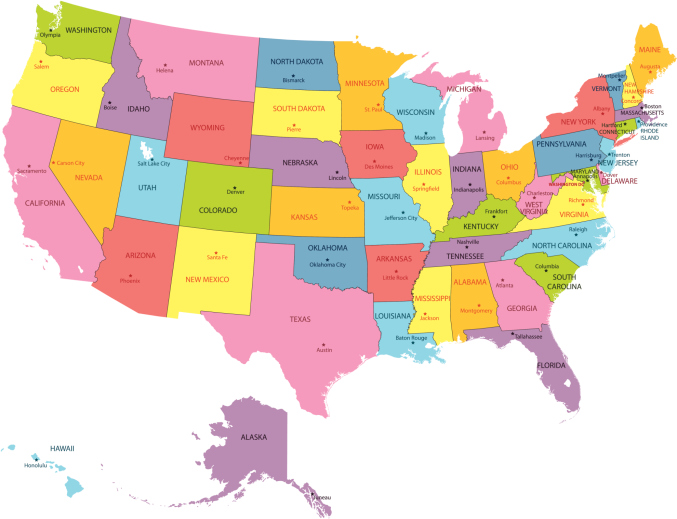
Ask 100 people how much money they would need to be rich and you would likely get 100 different answers. “Rich” is a subjective term — and there is no universally agreed upon income threshold. While there is no debate that people such as Oprah Winfrey or Jeff Bezos are rich, determining a base salary that would qualify someone as rich is not as simple. Here is a list of the richest person in every state.
As a relative quality rather than an absolute one, for many, being rich may simply mean having a higher income than the vast majority of other people. According to the U.S. Census Bureau, about half of all U.S. households earn $65,700 or more per year. However, only those households earning at least $131,350 per year are among the richest 20% of households nationwide. But just as median income varies considerably by state, so does the amount needed to be in the richest 20% of households in each state.
To determine the income it takes to be considered rich in each state, 24/7 Wall St. reviewed the minimum income needed to be in the highest earning 20% of households. Data on household income came from the U.S. Census Bureau’s 2019 American Community Survey. In some parts of the country, an annual household income of $94,750 is enough. In others, a minimum household income of over $170,000 is required to rank among the highest earners.
In states where the threshold to be in the wealthiest 20% of households is the highest, the overall cost of living also tends to be high. For example, in Massachusetts, where only households earning at least $171,600 are in the top 20%, goods and services are about 10% more expensive than they are on average nationwide, according to RPP data from the Bureau of Economic Analysis.
Conversely, in states like Arkansas and West Virginia, where a five-figure income can still be higher than what 80% of other households in the state earn, a dollar goes much farther than it does in most other parts of the country. Here is a look at the value of a dollar in every state.
Click here to see how much income it takes to be considered rich in every state.

Alabama
> Annual income needed to be in the top 20% of earners: $106,225 per household (6th lowest)
> Income controlled by highest 20% of earners: 50.5% (21st highest)
> Min. annual income to be in the top 5%: $189,695 per household (6th lowest)
> Median household income: $51,734 (5th lowest)
> Cost of living: 13.6% less expensive than US avg.
[in-text-ad]

Alaska
> Annual income needed to be in the top 20% of earners: $144,736 per household (12th highest)
> Income controlled by highest 20% of earners: 47.6% (4th lowest)
> Min. annual income to be in the top 5%: $242,208 per household (14th highest)
> Median household income: $75,463 (12th highest)
> Cost of living: 4.8% more expensive than US avg.

Arizona
> Annual income needed to be in the top 20% of earners: $120,982 per household (23rd highest)
> Income controlled by highest 20% of earners: 49.7% (25th lowest)
> Min. annual income to be in the top 5%: $220,936 per household (24th highest)
> Median household income: $62,055 (23rd lowest)
> Cost of living: 3.5% less expensive than US avg.

Arkansas
> Annual income needed to be in the top 20% of earners: $98,014 per household (3rd lowest)
> Income controlled by highest 20% of earners: 51.0% (13th highest)
> Min. annual income to be in the top 5%: $176,997 per household (3rd lowest)
> Median household income: $48,952 (3rd lowest)
> Cost of living: 14.7% less expensive than US avg.
[in-text-ad-2]

California
> Annual income needed to be in the top 20% of earners: $162,657 per household (4th highest)
> Income controlled by highest 20% of earners: 52.0% (5th highest)
> Min. annual income to be in the top 5%: $250,000+ per household (the highest – tied)
> Median household income: $80,440 (5th highest)
> Cost of living: 15.4% more expensive than US avg.

Colorado
> Annual income needed to be in the top 20% of earners: $147,217 per household (10th highest)
> Income controlled by highest 20% of earners: 49.3% (19th lowest)
> Min. annual income to be in the top 5%: $250,000+ per household (the highest – tied)
> Median household income: $77,127 (9th highest)
> Cost of living: 1.9% more expensive than US avg.
[in-text-ad]

Connecticut
> Annual income needed to be in the top 20% of earners: $161,063 per household (5th highest)
> Income controlled by highest 20% of earners: 53.4% (2nd highest)
> Min. annual income to be in the top 5%: $250,000+ per household (the highest – tied)
> Median household income: $78,833 (6th highest)
> Cost of living: 6.1% more expensive than US avg.

Delaware
> Annual income needed to be in the top 20% of earners: $134,594 per household (15th highest)
> Income controlled by highest 20% of earners: 48.7% (14th lowest)
> Min. annual income to be in the top 5%: $235,059 per household (18th highest)
> Median household income: $70,176 (16th highest)
> Cost of living: 1.2% less expensive than US avg.

Florida
> Annual income needed to be in the top 20% of earners: $117,017 per household (21st lowest)
> Income controlled by highest 20% of earners: 51.9% (6th highest)
> Min. annual income to be in the top 5%: $226,319 per household (22nd highest)
> Median household income: $59,227 (17th lowest)
> Cost of living: 0.6% more expensive than US avg.
[in-text-ad-2]

Georgia
> Annual income needed to be in the top 20% of earners: $122,832 per household (21st highest)
> Income controlled by highest 20% of earners: 51.4% (7th highest)
> Min. annual income to be in the top 5%: $233,979 per household (19th highest)
> Median household income: $61,980 (22nd lowest)
> Cost of living: 7.0% less expensive than US avg.

Hawaii
> Annual income needed to be in the top 20% of earners: $153,431 per household (6th highest)
> Income controlled by highest 20% of earners: 47.5% (3rd lowest)
> Min. annual income to be in the top 5%: $250,000+ per household (the highest – tied)
> Median household income: $83,102 (4th highest)
> Cost of living: 18.1% more expensive than US avg.
[in-text-ad]

Idaho
> Annual income needed to be in the top 20% of earners: $111,822 per household (14th lowest)
> Income controlled by highest 20% of earners: 47.6% (6th lowest)
> Min. annual income to be in the top 5%: $199,218 per household (11th lowest)
> Median household income: $60,999 (20th lowest)
> Cost of living: 7.5% less expensive than US avg.

Illinois
> Annual income needed to be in the top 20% of earners: $137,248 per household (14th highest)
> Income controlled by highest 20% of earners: 51.2% (8th highest)
> Min. annual income to be in the top 5%: $250,000+ per household (the highest – tied)
> Median household income: $69,187 (17th highest)
> Cost of living: 1.9% less expensive than US avg.

Indiana
> Annual income needed to be in the top 20% of earners: $110,606 per household (11th lowest)
> Income controlled by highest 20% of earners: 49.5% (21st lowest)
> Min. annual income to be in the top 5%: $194,407 per household (9th lowest)
> Median household income: $57,603 (14th lowest)
> Cost of living: 10.7% less expensive than US avg.
[in-text-ad-2]

Iowa
> Annual income needed to be in the top 20% of earners: $113,238 per household (17th lowest)
> Income controlled by highest 20% of earners: 48.1% (10th lowest)
> Min. annual income to be in the top 5%: $199,328 per household (12th lowest)
> Median household income: $61,691 (21st lowest)
> Cost of living: 10.8% less expensive than US avg.

Kansas
> Annual income needed to be in the top 20% of earners: $117,303 per household (22nd lowest)
> Income controlled by highest 20% of earners: 48.9% (16th lowest)
> Min. annual income to be in the top 5%: $211,256 per household (23rd lowest)
> Median household income: $62,087 (24th lowest)
> Cost of living: 10.0% less expensive than US avg.
[in-text-ad]

Kentucky
> Annual income needed to be in the top 20% of earners: $103,349 per household (4th lowest)
> Income controlled by highest 20% of earners: 50.8% (19th highest)
> Min. annual income to be in the top 5%: $185,241 per household (4th lowest)
> Median household income: $52,295 (7th lowest)
> Cost of living: 12.2% less expensive than US avg.
Louisiana
> Annual income needed to be in the top 20% of earners: $107,505 per household (8th lowest)
> Income controlled by highest 20% of earners: 52.3% (3rd highest)
> Min. annual income to be in the top 5%: $199,417 per household (13th lowest)
> Median household income: $51,073 (4th lowest)
> Cost of living: 10.9% less expensive than US avg.

Maine
> Annual income needed to be in the top 20% of earners: $111,898 per household (15th lowest)
> Income controlled by highest 20% of earners: 48.7% (15th lowest)
> Min. annual income to be in the top 5%: $202,639 per household (17th lowest)
> Median household income: $58,924 (16th lowest)
> Cost of living: same as U.S. avg.
[in-text-ad-2]

Maryland
> Annual income needed to be in the top 20% of earners: $164,179 per household (3rd highest)
> Income controlled by highest 20% of earners: 49.1% (18th lowest)
> Min. annual income to be in the top 5%: $250,000+ per household (the highest – tied)
> Median household income: $86,738 (the highest)
> Cost of living: 8.4% more expensive than US avg.

Massachusetts
> Annual income needed to be in the top 20% of earners: $171,613 per household (2nd highest)
> Income controlled by highest 20% of earners: 50.9% (14th highest)
> Min. annual income to be in the top 5%: $250,000+ per household (the highest – tied)
> Median household income: $85,843 (2nd highest)
> Cost of living: 9.7% more expensive than US avg.
[in-text-ad]

Michigan
> Annual income needed to be in the top 20% of earners: $115,802 per household (20th lowest)
> Income controlled by highest 20% of earners: 50.0% (24th highest)
> Min. annual income to be in the top 5%: $209,099 per household (22nd lowest)
> Median household income: $59,584 (19th lowest)
> Cost of living: 7.6% less expensive than US avg.

Minnesota
> Annual income needed to be in the top 20% of earners: $138,273 per household (13th highest)
> Income controlled by highest 20% of earners: 48.2% (11th lowest)
> Min. annual income to be in the top 5%: $244,552 per household (13th highest)
> Median household income: $74,593 (13th highest)
> Cost of living: 2.5% less expensive than US avg.

Mississippi
> Annual income needed to be in the top 20% of earners: $94,744 per household (the lowest)
> Income controlled by highest 20% of earners: 52.0% (4th highest)
> Min. annual income to be in the top 5%: $172,337 per household (2nd lowest)
> Median household income: $45,792 (the lowest)
> Cost of living: 14.0% less expensive than US avg.
[in-text-ad-2]

Missouri
> Annual income needed to be in the top 20% of earners: $111,802 per household (13th lowest)
> Income controlled by highest 20% of earners: 49.9% (25th highest)
> Min. annual income to be in the top 5%: $201,541 per household (15th lowest)
> Median household income: $57,409 (13th lowest)
> Cost of living: 11.2% less expensive than US avg.

Montana
> Annual income needed to be in the top 20% of earners: $108,877 per household (9th lowest)
> Income controlled by highest 20% of earners: 49.6% (24th lowest)
> Min. annual income to be in the top 5%: $187,867 per household (5th lowest)
> Median household income: $57,153 (11th lowest)
> Cost of living: 6.7% less expensive than US avg.
[in-text-ad]

Nebraska
> Annual income needed to be in the top 20% of earners: $117,570 per household (23rd lowest)
> Income controlled by highest 20% of earners: 48.0% (9th lowest)
> Min. annual income to be in the top 5%: $203,793 per household (18th lowest)
> Median household income: $63,229 (25th highest)
> Cost of living: 10.5% less expensive than US avg.

Nevada
> Annual income needed to be in the top 20% of earners: $119,790 per household (25th lowest)
> Income controlled by highest 20% of earners: 50.6% (20th highest)
> Min. annual income to be in the top 5%: $221,626 per household (23rd highest)
> Median household income: $63,276 (24th highest)
> Cost of living: 2.5% less expensive than US avg.

New Hampshire
> Annual income needed to be in the top 20% of earners: $145,865 per household (11th highest)
> Income controlled by highest 20% of earners: 48.0% (8th lowest)
> Min. annual income to be in the top 5%: $250,000+ per household (the highest – tied)
> Median household income: $77,933 (8th highest)
> Cost of living: 6.0% more expensive than US avg.
[in-text-ad-2]

New Jersey
> Annual income needed to be in the top 20% of earners: $171,760 per household (the highest)
> Income controlled by highest 20% of earners: 51.2% (9th highest)
> Min. annual income to be in the top 5%: $250,000+ per household (the highest – tied)
> Median household income: $85,751 (3rd highest)
> Cost of living: 15.2% more expensive than US avg.

New Mexico
> Annual income needed to be in the top 20% of earners: $105,652 per household (5th lowest)
> Income controlled by highest 20% of earners: 50.8% (18th highest)
> Min. annual income to be in the top 5%: $192,480 per household (8th lowest)
> Median household income: $51,945 (6th lowest)
> Cost of living: 8.9% less expensive than US avg.
[in-text-ad]

New York
> Annual income needed to be in the top 20% of earners: $151,926 per household (8th highest)
> Income controlled by highest 20% of earners: 54.4% (the highest)
> Min. annual income to be in the top 5%: $250,000+ per household (the highest – tied)
> Median household income: $72,108 (14th highest)
> Cost of living: 16.4% more expensive than US avg.

North Carolina
> Annual income needed to be in the top 20% of earners: $113,302 per household (18th lowest)
> Income controlled by highest 20% of earners: 51.0% (12th highest)
> Min. annual income to be in the top 5%: $213,009 per household (25th lowest)
> Median household income: $57,341 (12th lowest)
> Cost of living: 8.2% less expensive than US avg.

North Dakota
> Annual income needed to be in the top 20% of earners: $121,975 per household (22nd highest)
> Income controlled by highest 20% of earners: 49.1% (17th lowest)
> Min. annual income to be in the top 5%: $220,611 per household (25th highest)
> Median household income: $64,577 (20th highest)
> Cost of living: 9.4% less expensive than US avg.
[in-text-ad-2]

Ohio
> Annual income needed to be in the top 20% of earners: $113,789 per household (19th lowest)
> Income controlled by highest 20% of earners: 50.1% (23rd highest)
> Min. annual income to be in the top 5%: $204,940 per household (20th lowest)
> Median household income: $58,642 (15th lowest)
> Cost of living: 11.6% less expensive than US avg.

Oklahoma
> Annual income needed to be in the top 20% of earners: $107,252 per household (7th lowest)
> Income controlled by highest 20% of earners: 50.9% (17th highest)
> Min. annual income to be in the top 5%: $194,523 per household (10th lowest)
> Median household income: $54,449 (8th lowest)
> Cost of living: 11.6% less expensive than US avg.
[in-text-ad]

Oregon
> Annual income needed to be in the top 20% of earners: $129,218 per household (18th highest)
> Income controlled by highest 20% of earners: 48.6% (13th lowest)
> Min. annual income to be in the top 5%: $229,747 per household (21st highest)
> Median household income: $67,058 (18th highest)
> Cost of living: 1.1% more expensive than US avg.

Pennsylvania
> Annual income needed to be in the top 20% of earners: $124,987 per household (20th highest)
> Income controlled by highest 20% of earners: 50.9% (15th highest)
> Min. annual income to be in the top 5%: $233,467 per household (20th highest)
> Median household income: $63,463 (23rd highest)
> Cost of living: 2.5% less expensive than US avg.

Rhode Island
> Annual income needed to be in the top 20% of earners: $133,423 per household (16th highest)
> Income controlled by highest 20% of earners: 49.5% (20th lowest)
> Min. annual income to be in the top 5%: $235,524 per household (17th highest)
> Median household income: $71,169 (15th highest)
> Cost of living: 0.7% less expensive than US avg.
[in-text-ad-2]

South Carolina
> Annual income needed to be in the top 20% of earners: $112,365 per household (16th lowest)
> Income controlled by highest 20% of earners: 50.9% (16th highest)
> Min. annual income to be in the top 5%: $204,826 per household (19th lowest)
> Median household income: $56,227 (10th lowest)
> Cost of living: 8.9% less expensive than US avg.

South Dakota
> Annual income needed to be in the top 20% of earners: $111,512 per household (12th lowest)
> Income controlled by highest 20% of earners: 47.6% (5th lowest)
> Min. annual income to be in the top 5%: $190,156 per household (7th lowest)
> Median household income: $59,533 (18th lowest)
> Cost of living: 12.1% less expensive than US avg.
[in-text-ad]

Tennessee
> Annual income needed to be in the top 20% of earners: $109,765 per household (10th lowest)
> Income controlled by highest 20% of earners: 51.1% (10th highest)
> Min. annual income to be in the top 5%: $205,063 per household (21st lowest)
> Median household income: $56,071 (9th lowest)
> Cost of living: 10.1% less expensive than US avg.

Texas
> Annual income needed to be in the top 20% of earners: $128,878 per household (19th highest)
> Income controlled by highest 20% of earners: 51.0% (11th highest)
> Min. annual income to be in the top 5%: $241,212 per household (15th highest)
> Median household income: $64,034 (22nd highest)
> Cost of living: 3.2% less expensive than US avg.

Utah
> Annual income needed to be in the top 20% of earners: $132,560 per household (17th highest)
> Income controlled by highest 20% of earners: 47.1% (the lowest)
> Min. annual income to be in the top 5%: $235,835 per household (16th highest)
> Median household income: $75,780 (11th highest)
> Cost of living: 3.4% less expensive than US avg.
[in-text-ad-2]

Vermont
> Annual income needed to be in the top 20% of earners: $120,270 per household (24th highest)
> Income controlled by highest 20% of earners: 48.4% (12th lowest)
> Min. annual income to be in the top 5%: $212,823 per household (24th lowest)
> Median household income: $63,001 (25th lowest)
> Cost of living: 3.0% more expensive than US avg.

Virginia
> Annual income needed to be in the top 20% of earners: $153,003 per household (7th highest)
> Income controlled by highest 20% of earners: 50.5% (22nd highest)
> Min. annual income to be in the top 5%: $250,000+ per household (the highest – tied)
> Median household income: $76,456 (10th highest)
> Cost of living: 2.0% more expensive than US avg.
[in-text-ad]

Washington
> Annual income needed to be in the top 20% of earners: $151,396 per household (9th highest)
> Income controlled by highest 20% of earners: 49.6% (22nd lowest)
> Min. annual income to be in the top 5%: $250,000+ per household (the highest – tied)
> Median household income: $78,687 (7th highest)
> Cost of living: 7.8% more expensive than US avg.

West Virginia
> Annual income needed to be in the top 20% of earners: $97,399 per household (2nd lowest)
> Income controlled by highest 20% of earners: 49.6% (23rd lowest)
> Min. annual income to be in the top 5%: $171,816 per household (the lowest)
> Median household income: $48,850 (2nd lowest)
> Cost of living: 12.2% less expensive than US avg.

Wisconsin
> Annual income needed to be in the top 20% of earners: $117,929 per household (24th lowest)
> Income controlled by highest 20% of earners: 47.8% (7th lowest)
> Min. annual income to be in the top 5%: $202,582 per household (16th lowest)
> Median household income: $64,168 (21st highest)
> Cost of living: 8.1% less expensive than US avg.
[in-text-ad-2]

Wyoming
> Annual income needed to be in the top 20% of earners: $120,196 per household (25th highest)
> Income controlled by highest 20% of earners: 47.2% (2nd lowest)
> Min. annual income to be in the top 5%: $199,944 per household (14th lowest)
> Median household income: $65,003 (19th highest)
> Cost of living: 7.3% less expensive than US avg.
Thank you for reading! Have some feedback for us?
Contact the 24/7 Wall St. editorial team.
 24/7 Wall St.
24/7 Wall St.
 24/7 Wall St.
24/7 Wall St. 24/7 Wall St.
24/7 Wall St.

